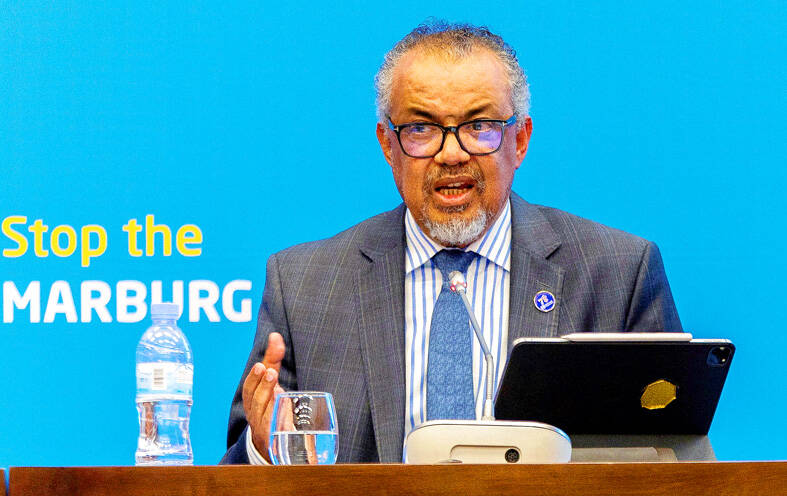Beijing yesterday insisted that it had shared information on COVID-19 “without holding anything back,” after the WHO implored China to offer more data and access to understand the disease’s origins.
COVID-19, which first emerged in the central Chinese city of Wuhan in December 2020, went on to kill millions of people, shred economies and overwhelm health systems.
The WHO on Monday published a statement saying that it was a “moral and scientific imperative” for China to share more information.

Photo: Reuters
In response, China defended its transparency, saying it had made the “largest contribution to global origin tracing research.”
“Five years ago ... China immediately shared epidemic information and viral gene sequence with the WHO and the international community,” Chinese Ministry of Foreign Affairs spokeswoman Mao Ning (毛寧) said.
“Without holding anything back, we shared our prevention, control and treatment experience,” she said.
Over the course of the pandemic, the WHO repeatedly criticized Chinese authorities for their lack of transparency and cooperation.
A team of specialists led by the WHO and accompanied by Chinese colleagues conducted an investigation into the pandemic’s origins in early 2021.
In a joint report, they favored the hypothesis that the virus had been transmitted by an intermediary animal from a bat to a human, possibly at a market.
A team has not been able to return to China since, and WHO officials have repeatedly asked for additional data.
Mao yesterday said that “more and more clues” pointed “to COVID-19’s origins having a global scope.”
China is “willing to continue working with various parties to promote global scientific origin tracing, and to make active efforts to prevent potential infectious diseases in the future,” she said.
WHO Director-General Tedros Adhanom Ghebreyesus last month said that “the world would still face some of the same weaknesses and vulnerabilities that gave COVID-19 a foothold five years ago” if a new pandemic emerged today, “but the world has also learnt many of the painful lessons the pandemic taught us, and has taken significant steps to strengthen its defenses against future epidemics and pandemics.”
Spooked by the devastation caused by COVID-19, nations in December 2021 decided to start drafting an accord on pandemic prevention, preparedness and response.
The WHO’s 194 member states negotiating the treaty have agreed on most of what it should include, but are stuck on the practicalities.
A key fault line lies between Western nations with major pharmaceutical industry sectors and poorer nations wary of being sidelined when the next pandemic strikes.
While the outstanding issues are few, they include the heart of the agreement: the obligation to quickly share emerging pathogens, and then the pandemic-fighting benefits derived from them such as vaccines.
The deadline for the negotiations is May.

GAINING STEAM: The scheme initially failed to gather much attention, with only 188 cards issued in its first year, but gained popularity amid the COVID-19 pandemic Applications for the Employment Gold Card have increased in the past few years, with the card having been issued to a total of 13,191 people from 101 countries since its introduction in 2018, the National Development Council (NDC) said yesterday. Those who have received the card have included celebrities, such as former NBA star Dwight Howard and Australian-South Korean cheerleader Dahye Lee, the NDC said. The four-in-one Employment Gold Card combines a work permit, resident visa, Alien Resident Certificate (ARC) and re-entry permit. It was first introduced in February 2018 through the Act Governing Recruitment and Employment of Foreign Professionals (外國專業人才延攬及雇用法),

RESILIENCE: Deepening bilateral cooperation would extend the peace sustained over the 45 years since the Taiwan Relations Act, Greene said Taiwan-US relations are built on deep economic ties and shared values, American Institute in Taiwan (AIT) Director Raymond Greene said yesterday, adding that strengthening supply chain security in critical industries, enhancing societal resilience through cooperation and deepening partnerships are key to ensuring peace and stability for Taiwan in the years ahead. Greene made the remarks at the National Security Youth Forum, organized by National Taiwan University’s National Security and Strategy Studies Institution in Taipei. In his address in Mandarin Chinese, Greene said the Taiwan-US relationship is built on deep economic ties and shared interests, and grows stronger through the enduring friendship between

CAUTION URGED: Xiaohongshu and Douyin — the Chinese version of TikTok — are tools the Chinese government uses for its ‘united front’ propaganda, the MAC said Mainland Affairs Council (MAC) Minister Chiu Chui-cheng (邱垂正) yesterday urged people who use Chinese social media platforms to be cautious of being influenced by Beijing’s “united front” propaganda and undermining Taiwan’s sovereignty. Chiu made the remarks in response to queries about Chinese academic Zhang Weiwei (張維為) saying that as young Taiwanese are fond of interacting on Chinese app Xiaohongshu (小紅書, known as RedNote in English), “after unification with China, it would be easier to govern Taiwan than Hong Kong.” Zhang is professor of international relations at Shanghai’s Fudan University and director of its China Institute. When giving a speech at China’s Wuhan

ENHANCE DETERRENCE: Taiwan has to display ‘fierce resolve’ to defend itself for China to understand that the costs of war outweigh potential gains, Koo said Taiwan’s armed forces must reach a high level of combat readiness by 2027 to effectively deter a potential Chinese invasion, Minister of National Defense Wellington Koo (顧立雄) said in an interview with the Chinese-language Liberty Times (sister newspaper of the Taipei Times) published yesterday. His comments came three days after US Secretary of State Marco Rubio told the US Senate that deterring a Chinese attack on Taiwan requires making a conflict “cost more than what it’s worth.” Rubio made the remarks in response to a question about US policy on Taiwan’s defense from Republican Senator John Cornyn, who said that Chinese